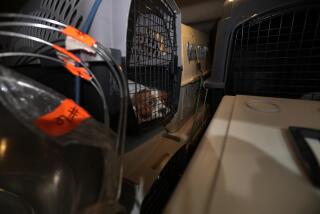Jet-Set Pets Will Get Passports
- Share via
LONDON — A dog’s life just got better.
At least, the life of a traveling dog, or cat, will be significantly improved starting Feb. 28 when Britain relaxes its century-old quarantine laws to allow some animals into the country on pet passports.
This undoubtedly will be a great relief to French poodles, German shepherds and other continental canines that will be allowed into Britain without first spending six months in solitary confinement to prove they are disease-free.
U.S. and Canadian pets, however, still face the slammer.
The pilot program will be of comfort to many owners of Britain’s 9.7 million cats and dogs who may want to take their pets with them on holiday to Tuscany or Bordeaux and then bring them home straight away.
“I’ve always thought it was unworthy of my country to allow these quarantine kennels to operate. It’s such an unkind system,” said Lady Mary Fretwell, a champion of the pet passport system.
Fretwell will be taking her basset hound Claud to France later this month so that they can return to Britain together on the inaugural trip for pets with passports, nearly six years after she began campaigning to change the stringent quarantine laws.
This has been an emotional issue for a pet-loving country where citizens enjoy watching television programs about sheep dogs and animal surgery. It is of interest to Europeans who take their dogs with them to restaurants and along on weekend trips, and to people who want to move to Britain with their pets.
“The scheme is important for people who work abroad, like army people who are posted all over, as well as for the average traveler,” said Giovanna Grasso, an Italian American who lives in London with her husband, two children and two dogs, Pompeo and Brutus.
“Lots of people now have property abroad and want to take their pets with them,” she said. “And I have several friends in the U.S. who have been offered jobs in banks and other places but who won’t come here because of the quarantine rules. They’re afraid their dogs will die.”
While most of Europe has long allowed dogs and cats freedom of travel, Britain maintained its harsh restrictions to keep the island nation rabies-free. However, dozens of pets died each year during quarantine, not of rabies but of stress, loneliness and illnesses picked up in kennels.
Former Hong Kong Gov. Chris Patten refused to put his dogs, Whisky and Soda, in quarantine after surrendering Britain’s colony to China in 1997, and settled them instead on a farm in France. Patten shuttles from his new post in Brussels as the European Union external affairs commissioner and his office in London to his Norfolk terriers in the French countryside.
But now there is another option. The new program is not simple, but it is deemed a happier alternative to quarantine--and nearly as fail-safe.
The pet must be fitted with an identification microchip, be vaccinated against rabies and have a blood test from an approved laboratory to prove that the vaccine is working. Then the cat or dog must be issued an official pet certificate and be treated against ticks and tapeworms before entering Britain on designated air, rail and ferry lines.
Initially, only 22 countries in Western Europe will be eligible for Britain’s pet passport scheme. The government hopes to include Australia and New Zealand soon, at least for guide dogs, but U.S. cats and dogs will have to wait.
The British government believes rabies is too widespread among wildlife in North America to risk pet entry without quarantine--a determination Americans reject, given the efficacy of the rabies vaccine.
The U.S. 3rd Air Force’s base in Mildenhall, about 60 miles northeast of London, has begun a survey of its staff to see if the quarantine rules were a factor in their consideration of postings in Britain.
They were for Lt. Col. Terry Donaldson, although he ultimately accepted the assignment. He arrived in Britain three years ago and put his black Labrador, Barkie, in quarantine.
“It was not a happy experience for a dog,” Donaldson said, “and I wouldn’t recommend it to anyone.”
More to Read
Sign up for Essential California
The most important California stories and recommendations in your inbox every morning.
You may occasionally receive promotional content from the Los Angeles Times.













